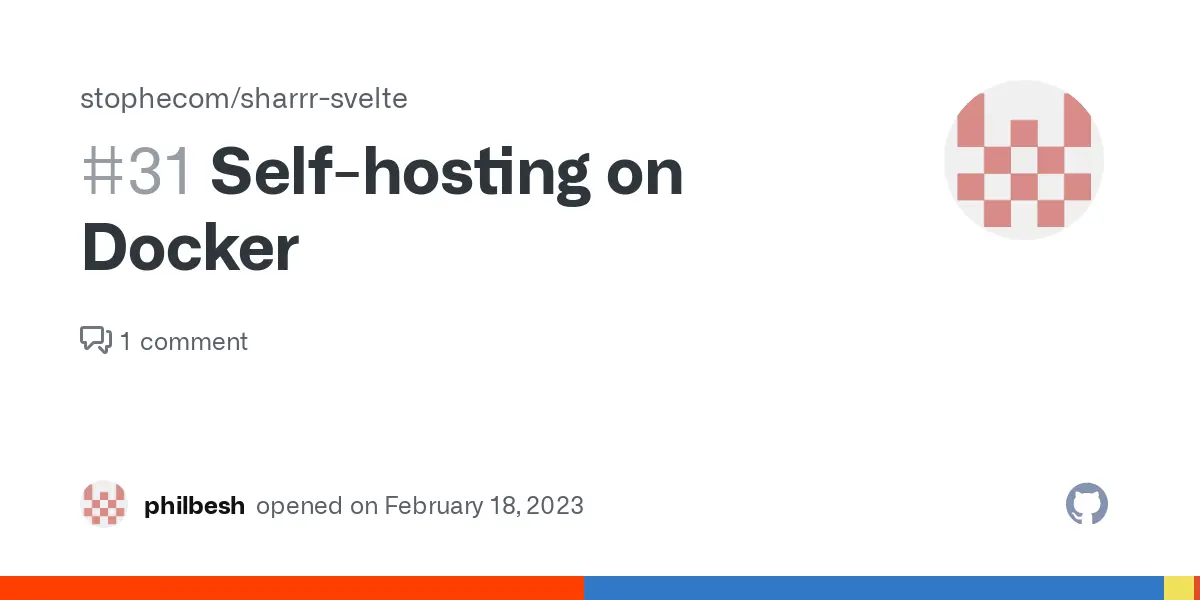
Do you have any instructions on how to self-host this in Docker? Or is there an image somewhere to look? If not I can try to package it.

I recommend FSArchiver, it can handle different size partitions
Recently I stumbled upon nb
For me: uploading single file using their client ~25MB/s, downloading ~50MB/s (30-60MB/s). In newer versions of their linux client it's possible to mount filen as network drive or to start webdav/s3 server.
Kbin no run
Unsolvable epic store captcha
"Incorrect response. Please refresh the page."
I have attempted 10 captchas in a row, but to no avail. Each time, the response is marked as incorrect. The login issue is only part of the problem. When I try to redeem a freebie on my account, I encounter the same captcha issue. This persists regardless of whether I am using a VPN or not. It's becoming extremely frustrating.
It depends if your reverse proxy is inside your home network or outside. It should work without any other configuration if you forward ports 80&443 from external domain with something similar to rathole and configure reverse proxy inside home network.
This is not an answer to your question about using the same url, but see this article, it might be helpful. Tl;dr: mdns + reverse proxy.
Install Termux and run sshd -D -d -p <port>
You can mount remote with rclone and fine tune caching to your liking: https://rclone.org/commands/rclone_mount/#vfs-file-caching
I use FSArchiver. There's nice list on Archwiki.
What is the advantage of this extension over the bookmarklet? https://shaarli.readthedocs.io/en/master/Usage.html#adding-editing-shaares
Grab live cd and run it in qemu:
undefined
qemu-system-x86_64 -enable-kvm -machine type=pc \ -cpu host -smp 2 \ -m 4096 -device virtio-balloon \ -vga virtio -display sdl,gl=on \ -usb -device usb-tablet \ -boot d -cdrom "$@"
It can be achieved with nat proxy on the server https://serverfault.com/questions/379360/vpn-tunneling-to-hide-real-ip-through-my-proxy-server-while-showing-the-clien
Rclone works with mega (25gb free), storj (25gb free), google (15gb free).
Scaleway also offers glacier storage class. ~€0.002/GB/month. €0.009/GB retrieval. €0.01/GB transfer.
It depends on how much cpu power, disk space, ram, side databases, backup space, etc. you need. Once you know all of it, just compare prices. Check also hetzner, scaleway, vultr, digital ocean, ovh. Good luck 🤞
There's also RCX. But it doesn't support all possible remotes through gui, however all remote types can be added by importing rclone conf file.
You can put the setting in user.js file. For example, check arkenfox.
I use rathole tunnel (similar to frp) on VPS and Caddy locally. VPS and my local machine are connected with wireguard VPN. DNS points to VPS, TLS certificates are managed locally by Caddy.
I use mine as kitchen radio with https://moodeaudio.org/
Where does pipewire store its properties?
For example, I set firefox to some custom sink using pavucontrol, but now I want to reset it to default. How can I do this without using pavucontrol, just cli?
EDIT:
Found it :) they are in ~/.local/state/wireplumber/restore-stream. To remove target sink, pipewire and wireplumber have to be restarted:
undefined
systemctl --user stop pipewire sed -i '/:target/d' ~/.local/state/wireplumber/restore-stream systemctl --user start wireplumber
Other solution is just to reroute all active streams to the default sink:
undefined
sink="$(pactl get-default-sink)"
pactl list short sink-inputs | sed -r 's/([0-9]+).*/\1/' | while read appId; do
pactl move-sink-input $appId "$sink"
done
I'm a fan of managing dotfiles with plain git. I think it could be orchestrated a bit to make it more declarative.
Sharrr in a container?

Do you have any instructions on how to self-host this in Docker? Or is there an image somewhere to look? If not I can try to package it.

Has anyone ever tried to run sharrr in a container?